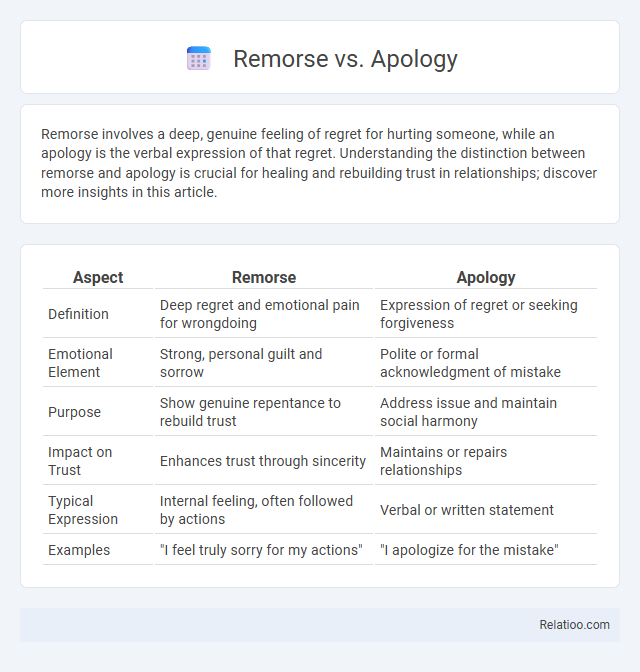Remorse involves a deep, genuine feeling of regret for hurting someone, while an apology is the verbal expression of that regret. Understanding the distinction between remorse and apology is crucial for healing and rebuilding trust in relationships; discover more insights in this article.
Table of Comparison
| Aspect | Remorse | Apology |
|---|---|---|
| Definition | Deep regret and emotional pain for wrongdoing | Expression of regret or seeking forgiveness |
| Emotional Element | Strong, personal guilt and sorrow | Polite or formal acknowledgment of mistake |
| Purpose | Show genuine repentance to rebuild trust | Address issue and maintain social harmony |
| Impact on Trust | Enhances trust through sincerity | Maintains or repairs relationships |
| Typical Expression | Internal feeling, often followed by actions | Verbal or written statement |
| Examples | "I feel truly sorry for my actions" | "I apologize for the mistake" |
Understanding Remorse: A Deep Emotional Response
Remorse is a profound emotional response characterized by genuine regret and sorrow for causing harm or wrongdoing, deeply impacting Your conscience and motivating positive behavioral change. Unlike a simple apology, which is a verbal acknowledgment of error, remorse reflects an internalized understanding of the consequences of one's actions. This emotional depth makes remorse a crucial element in authentic reconciliation and healing processes.
Defining Apology: Verbalizing Accountability
An apology involves explicitly verbalizing accountability by acknowledging specific actions or behaviors that caused harm or offense. It communicates recognition of responsibility and expresses regret to foster understanding and repair relationships. Unlike remorse, which is an internal feeling of guilt, an apology requires outward verbal expression to facilitate reconciliation.
Key Differences Between Remorse and Apology
Remorse is a deep, internal feeling of regret and guilt for a wrongdoing, reflecting genuine emotional acknowledgment of harm caused, whereas an apology is the external expression of that feeling, often communicated through words or actions to seek forgiveness. Your ability to distinguish remorse from an apology hinges on understanding that remorse drives sincere apologies but does not automatically result in one, as some apologies may be insincere or obligatory without true remorse. The key difference lies in remorse being an authentic emotional state, while an apology is a communicative act aimed at repairing relationships and acknowledging responsibility.
The Psychology Behind Remorse
The psychology behind remorse involves a deep emotional response reflecting genuine regret and self-awareness for causing harm, differentiating it from a simple apology, which may lack emotional depth. Remorse engages cognitive and affective processes that foster empathy and motivate corrective behavior, highlighting an internal moral compass at work. Understanding this psychological foundation is crucial for distinguishing true remorse from superficial apologies or expressions of regret.
The Components of a Genuine Apology
A genuine apology consists of acknowledging wrongdoing, expressing sincere remorse, and offering a commitment to change behavior. Remorse involves an emotional response reflecting regret and empathy for the harm caused, while an apology articulates this feeling through words and actions. Effective apologies also include taking responsibility and seeking forgiveness to restore trust and repair relationships.
Why Remorse Matters in Conflict Resolution
Remorse plays a crucial role in conflict resolution because it conveys genuine emotional regret, fostering trust and healing between parties. Unlike a simple apology, remorse demonstrates deep understanding of the harm caused, which can lead to meaningful reconciliation. Expressing remorse helps to validate the feelings of the injured party, promoting empathy and long-term resolution.
Can You Apologize Without Feeling Remorse?
Apologizing without feeling remorse is possible when an individual acknowledges a mistake or social expectation without genuine emotional regret, often to maintain relationships or social harmony. Remorse involves a deep, personal sense of guilt and sorrow for wrongdoing, while an apology is a verbal or written expression that may be sincere or strategic. Understanding the distinction between remorse and apology is crucial in conflict resolution and emotional intelligence, as true reconciliation often requires both acknowledgment and heartfelt contrition.
The Role of Empathy in Remorse and Apology
Empathy plays a crucial role in distinguishing remorse from a simple apology, as genuine remorse reflects a deep understanding of the impact of one's actions on others' feelings, whereas an apology may not always convey this emotional awareness. Your ability to express remorse hinges on recognizing and sharing the emotional experience of those affected, which fosters trust and facilitates emotional healing. This empathetic connection transforms an apology from a mere statement of regret into a meaningful acknowledgment of hurt and a commitment to change.
Impact of Remorse and Apology on Relationships
Remorse expresses deep personal regret and emotional pain for causing harm, which can heal wounds by showing genuine empathy and accountability. An apology communicates acknowledgment of wrongdoing and a willingness to make amends, fostering trust and open dialogue in Your relationships. The impact of both remorse and apology strengthens emotional bonds by promoting understanding, forgiveness, and the renewal of connection.
Cultivating Sincere Remorse and Effective Apologies
Cultivating sincere remorse involves genuine self-reflection and acknowledgment of wrongdoing, distinct from mere apologies which can be superficial or insincere. Effective apologies require not only expressing regret but also taking responsibility and demonstrating commitment to change, bridging the emotional gap caused by the offense. Understanding the difference between remorse and apology is crucial for rebuilding trust, as remorse conveys deeper emotional regret while an apology serves as the communicative act of addressing that regret.

Infographic: Remorse vs Apology
 relatioo.com
relatioo.com